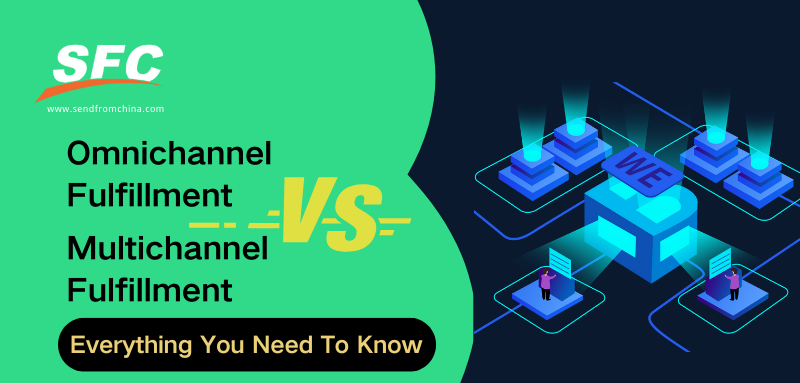Table of Contents
Omnichannel Fulfillment vs Multichannel Fulfillment: Everything You Need To Know
Time: Apr 18,2024 Author: SFC Source: www.sendfromchina.com

Content Table
1. What Is Omnichannel Fulfillment
2. What Is Multichannel Fulfillment
3. What Are the Differences between Omnichannel fulfillment and multichannel fulfillment
4. Pros and Cons of Omnichannel Fulfillment vs Multichannel Fulfillment
5. FAQs about Omnichannel Fulfillment vs Multichannel Fulfillment
1. What Is Omnichannel Fulfillment
How Omnichannel Fulfillment Works
2. What Is Multichannel Fulfillment
How Multichannel Fulfillment Works
3. What Are the Differences between Omnichannel fulfillment and multichannel fulfillment
Customer Experience
Integration
Inventory Management
Order Fulfilllment
Data and Analytics
4. Pros and Cons of Omnichannel Fulfillment vs Multichannel Fulfillment
Pros and cons of omnichannel fulfillment
Pros
- Seamless Customer Experience: Customers enjoy a consistent and unified shopping experience across all channels, enhancing satisfaction and loyalty.
- Improved Inventory Management: Centralized inventory across all channels reduces the risks of overstocking and stockouts, and supports flexible fulfillment options like buying online, picking up in-store.
- Enhanced Data Integration: Integrated customer data provides deep insights into customer behavior, allowing for more effective personalization and targeted marketing.
- Increased Sales Opportunities: The seamless experience and convenience can lead to increased customer retention and higher sales as customers can shop through multiple touchpoints.
Cons
- Higher Implementation Costs: Setting up an omnichannel system can be expensive due to the technology and infrastructure needed to integrate all channels.
- Complexity in Management: Managing an omnichannel strategy requires sophisticated systems and processes, which can be complex and resource-intensive to maintain.
- Technology Dependence: Relies heavily on advanced IT solutions for real-time inventory and data analytics, which requires ongoing investment in technology upgrades and maintenance.
Pros and cons of multichannel fulfillment
Pros
- Channel Specialization: Each channel can be optimized independently to cater to specific customer segments or market needs, potentially maximizing the effectiveness of each channel.
- Flexibility in Implementation: Companies can scale and adapt their channel offerings without the need for full integration, allowing for more gradual investments.
- Reduced Initial Setup Costs: Typically, starting with multichannel fulfillment can be less costly than omnichannel, as it does not require immediate integration of all systems and processes.
Cons
- Inconsistent Customer Experience: Customers may face different service levels, prices, and product availability across channels, leading to confusion and dissatisfaction.
- Inefficiencies in Inventory Management: Separate inventories for each channel can lead to higher costs, duplicated stock, and missed sales opportunities due to unavailability in one channel while being available in another.
- Limited Customer Insights: The lack of integrated data across channels can hinder a comprehensive understanding of customer behaviors and preferences, reducing the effectiveness of cross-channel marketing strategies.
5. FAQs about Omnichannel Fulfillment vs Multichannel Fulfillment
1. What is the main advantage of omnichannel fulfillment over multichannel?
The main advantage is the seamless customer experience across all shopping channels, which can lead to higher customer satisfaction and loyalty.2. Can small businesses benefit from omnichannel fulfillment?
Yes, if they are looking to scale and provide a unified customer experience, omnichannel can be beneficial even for smaller businesses.3. Is multichannel fulfillment cheaper than omnichannel?
Initially, it might be due to lower technological investments, but over time, the inefficiencies might lead to higher operational costs.4. How does omnichannel fulfillment affect inventory management?
It improves inventory efficiency and accuracy, reducing the risk of overstock and stockouts through integrated real-time management.5. Can a business switch from multichannel to omnichannel fulfillment?
Yes, many businesses transition to omnichannel to improve efficiency and customer experience, though it requires significant investment in technology and strategy overhaul. Post Views:2803
Post Views:2803
Copyright statement: The copyright of this article belongs to the original author. Please indicate the source for reprinting.
Previous Post
Why Is Building Community Important For Your Crowdfunding
Next Post
What Are Supply Chain Management KPIs? All You Need To Know About SCM KPIs
TAGS
Hot Research
Recent News
Get a Custom China Fulfillment Solution with FREE Storage for 30 Days
 Want to know about our services, fees or receive a custom quote?
Want to know about our services, fees or receive a custom quote?
 Please fill out the form on the right and we will get back to you within a business day.
Please fill out the form on the right and we will get back to you within a business day.
 The more information you provide, the better our initial response
will be.
The more information you provide, the better our initial response
will be.





 TAGS:
TAGS: